Video by Amy Peterson
How Covid-19 Has Altered University Life
College goes virtual during the coronavirus pandemic and disrupts plans for graduating seniors.
In the days and weeks that followed, we would think of our time in New York in terms of before and after To Kill a Mockingbird.
My classmates and I were in the city over spring break with our Cultural Memory course. We had been looking forward to seeing the play on Broadway.
Seconds after the curtain closed and the lights snapped on, a voice to my right gasped, “Tom Hanks has it!”
A blond man four rows ahead waved his phone and moaned, “The NBA season’s canceled.”
To my left a classmate rattled off a news headline: “Trump Cancels Air Travel With Europe.”
My group — seven TCU students and one professor — hustled outside, our feet trampling dozens of crushed Playbills, tearing apart the black-and-white photos of Ed Harris’ stoic Atticus.
We huddled outside the Shubert Theatre, no one speaking a word about the play. We were mesmerized by the chaos unfolding on Twitter.
We kept asking the same questions, even though we knew there were no answers: Would school be canceled? What if airspace shut down entirely? Would we be able to get out of New York?
Suddenly, we all looked up from our phones with the same sinking revelation: We were two blocks from Times Square, at the heart of the intensifying pandemic. The coronavirus was no longer a distant threat; it had become our reality.
Cultural Memory
Each year, Ron Pitcock, acting dean of the John V. Roach Honors College, takes students from his Cultural Memory course to New York during spring break. The class examines how society interprets and remembers monumental events such as John F. Kennedy’s assassination.
The second half of the semester, the course focuses on literature about the Sept. 11 terrorist attacks. Through visiting the 9/11 Memorial & Museum, the 9/11 Tribute Museum and historical landmarks across the city, we would be able to analyze a key question of the class: How do we as a society remember pivotal moments in our history as we move forward?
Before we left, Pitcock addressed the coronavirus headlines, saying we would need to be cautious and vigilant. When we arrived at LaGuardia Airport on March 8, there were 106 cases in the state of New York and only 12 in the city. No one could have known the extent of the damage Covid-19 would do to public health and to the economy.
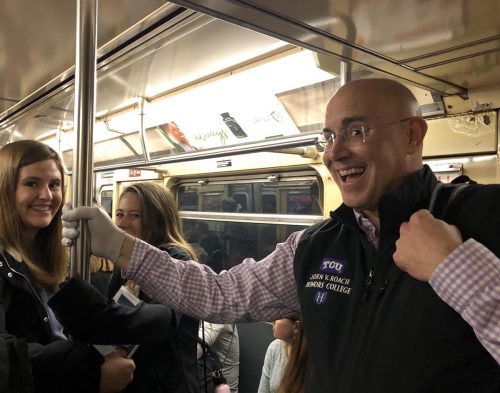
Katie Kelton and Ron Pitcock travel by subway in New York City. Pitcock wore a glove to touch the train’s railing. Courtesy of Madelyn Hicks
As we strolled through Central Park and viewed the city from the top of the Empire State Building, fears about the virus trickled through Manhattan. The city that never sleeps ground to a halt. Pitcock was armed with bottles of peach-scented hand sanitizer that we passed around every 20 minutes. Walking through Times Square, I held my breath and stuffed my hands in my coat pockets. As we crammed onto subway cars, our professor pulled on plastic gloves before grabbing the railing.
“If you’re walking around the street and you cough, everyone scorns you; it’s like you’re wearing a scarlet letter,” Pitcock told a co-worker on the phone.
On March 11, our fourth day in NYC, the World Health Organization deemed the coronavirus a global pandemic. At the hotel, Pitcock met with colleagues via video about TCU’s transition to online learning while students had free time to explore the city.
Later that day, as we gathered in the hotel lobby to head out for dinner before the play, Pitcock texted us to say he was caught up and to proceed without him.
As we walked to the restaurant, our phones buzzed.
Dear Horned Frogs,
Texas Christian University remains vigilant in monitoring the spread of coronavirus in our community, and as such, we have been preparing the campus for the potential impact from COVID-19. TCU’s top priority is always the safety and well-being of our students, faculty and staff, and we make decisions with the community in mind.
The email from Chancellor Victor J. Boschini, Jr. outlined the plan to extend spring break by a week to give professors time to move their classes to an online format. Virtual learning would begin March 23 and soon became the plan for the remainder of the semester.
Midway through dinner, Pitcock joined us. After we had left New York, he told me this moment stands out in his mind. The concerned looks on our faces signaled the realization that there were about to be major changes not just within the TCU community but throughout the world.
Return Trips
March 11 marked the wakeup call for many Americans, but the consequences of the coronavirus were already a reality for hundreds of TCU students studying abroad.
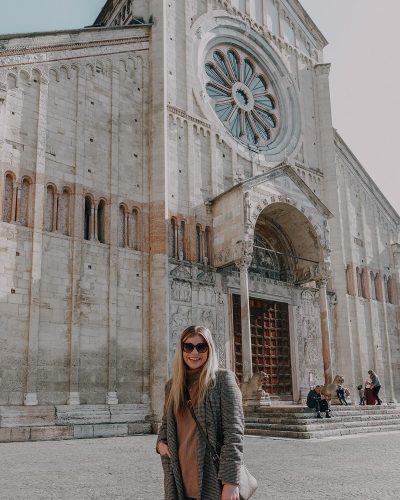
Lindi Goff was spending the semester in Florence, Italy, when the coronavirus spread to Europe. Courtesy of Lindi Goff
Lindi Goff, a junior strategic communication major, was spending the semester in Florence, Italy. A native of Flower Mound, Texas, Goff was excited about the opportunity to live overseas for the first time. She loved navigating the narrow streets near the white-marbled Basilica di Santa Croce on her daily walks to the Lorenzo de’ Medici University campus.
Throughout her five weeks abroad, Goff traveled on weekends, visiting places such as Lake Como and Rome. After spring break, she planned to see Lisbon, Amsterdam and London.
Coronavirus alerts became more urgent as the semester progressed, but Goff said she and her fellow students in Italy thought of the virus as far away, unthreatening. Everything changed on Feb. 28, when the TCU Center for International Studies emailed students in Florence and Rome:
Dear Italy Frogs,
We just learned that the Centers for Disease Control and Prevention and the U.S. State Department changed the travel advisory with respect to Italy, and they now advise against all non-essential travel to Italy. Accordingly, TCU is now directing all its students in Italy to return to the U.S. as soon as possible.
A stunned Goff immediately called her parents, who urged her to return. Together they coordinated her trip home.
Goff spent the remainder of the semester taking online classes with Lorenzo de’ Medici University while living in quarantine with her family in Texas.
She had expected to be able to return to TCU’s campus to visit friends and professors. “I thought when I got home everything would be normal. I didn’t expect things to escalate like they did in Florence.”
Goff said she is grateful for her experience in Italy yet dismayed at the sudden conclusion of her time in Florence. As she shared memories of her travels, Goff sighed as she reflected, “I just feel like I scratched the surface.”

Ryan Graham’s time studying abroad in Spain was cut short when President Donald Trump announced travel restrictions. Courtesy of Ryan Graham
As the pandemic intensified in Europe, Ryan Graham knew her time studying in Madrid would be cut short as well. March 8 marked her midterm exam week with La Universidad Carlos III. She had planned to fly to Dublin with friends the following Friday to celebrate St. Patrick’s Day.
On March 12, around 2 a.m., the junior kinesiology major’s phone rang. Squinting at the screen, she saw she had missed 10 calls from her mom in California. She shot up in bed upon hearing her mom’s panic: “Trump’s canceling travel to Europe. You need to be back in America before Friday at midnight. We’ve booked you on a flight that leaves in eight hours.”
While the travel order wouldn’t have impacted Graham as a U.S. citizen, she spent the morning in a dazed confusion. Everything had happened so quickly.
“So many of us had made sacrifices to study abroad with our finances, our academic plans,” she lamented.
Tracy Williams ’96, associate director of TCU’s Center for International Studies, said the safety and well-being of students are the center’s highest priorities. Collaboration with security experts and university administrators ultimately influenced TCU’s decision to bring all spring study-abroad students home.
“I think the world is going to come out of this looking and feeling a little different,” Williams said. “It’s hard to know what the impact of Covid-19 will be. But I think students will continue to want to study abroad.”
Learning Is Adapting
From the moment Chancellor Boschini sent the first notice about online learning, I realized the switch to virtual classes would require intense adjustments from both faculty and students.
I immediately thought of my class Service Learning in the Latino Community with Mary McKinney ’75, senior instructor of Spanish. The course pairs students with Fort Worth-area organizations. Once a week, instead of meeting for class on campus, students volunteer and practice their Spanish-speaking skills in the community.
I had been assisting teenage immigrants at Fort Worth ISD’s International Newcomers Academy and was crushed to receive notice that we would no longer be going to volunteer. I had no idea how my service learning class would be able to transition online.
TCU’s Koehler Center for Instruction, Innovation & Engagement provided resources to help faculty quickly move to teaching online, and McKinney developed content that would still focus on the theme of service.
Each week, my classmates and I read an essay, poem or historical text in Spanish and then answered questions about how the authors’ ideas reflect service. McKinney’s adaptability led to a stimulating course well-suited for online learning.
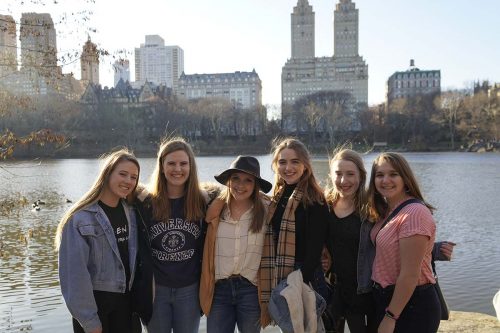
(L-R): Ella Gibson, Katie Kelton, Elizabeth Johnson, Madelyn Hicks, Emily Hoffer and Connie Linardos were in New York City for their Cultural Memory class when fears of Covid-19 spread to the U.S. Courtesy of Katie Kelton
Some courses couldn’t be shifted online. Junior biology and chemistry major Emily Hoffer — one of my Cultural Memory classmates who was also in New York — had been experimenting with biosensors in a lab in hopes of detecting cancer enzymes. The lab was temporarily shut down.
Hoffer continued some work from home in Arlington, Texas, and planned to return to the lab as soon as it reopened. She said she was impressed with the online science courses. “TCU has been really good about communicating, and all of my professors have been checking in and making sure that we’re doing good coursework.”
In New York, Hoffer and I discussed our worries about the Cultural Memory course changing after the break. But our class still had animated discussions through Zoom meetings. Every Wednesday night, Pitcock hosted a Cultural Memory Clubhouse — “an optional but lively check-in” — where students chatted about the class, our lives, and any fears or worries we had about the growing pandemic.
“The hardest part about working remotely is knowing what I am missing,” Pitcock said. “I miss the random conversations that happen in hallways and while getting coffee. I miss students dropping by the office to chat — that never happens on Zoom. I miss walking through campus and meeting someone new. I miss seeing students in 3D and hearing them in surround sound. I miss seeing ideas grow on a whiteboard and … I miss looking outside my window and seeing happy students walk by Frog Fountain, knowing their biggest crisis is an upcoming test or paper.”
Creating Community
Throughout the coronavirus-mandated transition, TCU maintained a sense of unity across its (virtual) campus, providing online counseling, advising and academic support.
Craig Allen, director of Housing & Residence Life, estimated that just under 300 students remained in campus housing as of early April. “Students who are here are being very respectful of social distancing,” he said. “They’re being very smart, very responsible.”
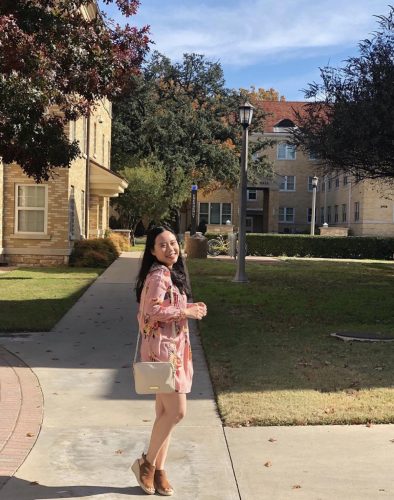
Tram Nguyen, an international student from Vietnam, finished the semester on campus instead of risking exposure to Covid-19 during traveling. Courtesy of Tram Nguyen
TCU’s Market Square started offering three free meals a day for remaining students and the few faculty and staff whose presence was deemed essential for support and continuity. Junior supply-chain management major Tram Nguyen ate Market Square meals every day and received a box of fresh produce from the school once a week.
An international student from Hanoi, Vietnam, Nguyen said she realized traveling home would be too much of a health risk, so she decided to finish the semester in her room in the Pamela and Edward Clark Hall, where she was a resident assistant.
While Nguyen said living in quarantine thousands of miles from family was difficult, she tried to stay connected by talking with her mom daily and catching up with her family during their weekly Wednesday bingo game.
Living on a near-empty campus was a challenge. “It’s definitely eerie here. … But now the tulips are coming out, which is great, but there’s no one here to see it.”
Brad Thompson ’04 (MLA ’19), assistant director of Student Activities, worked to provide a semblance of community through virtual What2Do@TCU activities. The website — usually packed with club announcements, speaker series and other campus events — started featuring flyers for virtual gatherings and videos such as “Self Care at Home,” “Overcoming Anxiety” and “Painting With Bob Ross.”
“Even though we may not be together on campus, the spirit of the Horned Frog community is still alive and strong,” Thompson said. “Helping our students connect and feel a part of that campus culture, even though we may be separated by crisis, is essential as we move forward.”
Every Friday, students and faculty wore purple to Zoom meetings to uphold the Go Purple Friday tradition and shared photos and stories on social media using #TCUtogether. The trademark billboard at South University Drive and Park Hill Drive, which often showcases TCU Athletics, featured a new TCU slogan: “Wherever We May Go, Our Hearts Are Here.”
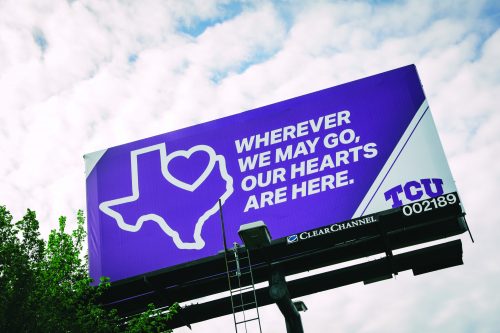
After classes moved to online-only instruction due to Covid-19 concerns, the billboard on University and Park Hill was switched to let all know that “Wherever we may go, our hearts are here.” Photo by Amy Peterson | Design by Kris Copeland
The New Senioritis
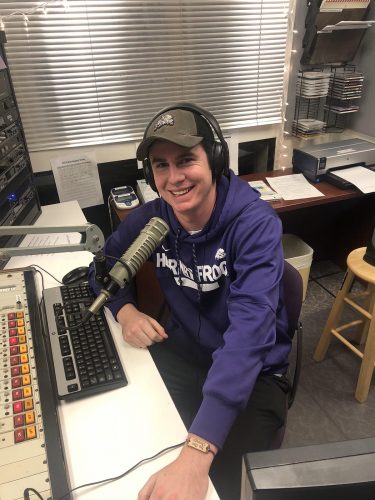
Senior sports broadcasting major Tim Daly postponed his graduation until December. Courtesy of Tim Daly
Senior sports broadcasting major Tim Daly said he found the cancellation of all sports — at TCU and across the globe — to be an especially painful blow. He had planned to graduate in May but recognized the challenges the pandemic presented to the sports industry and for people like him who planned to seek employment in the field. Daly decided to drop all but one of his spring classes and postpone his graduation until December 2020.
“I never thought I’d find myself in the situation where sports didn’t exist,” he said. “And that’s kind of the point we’re at right now. For the next extended period of time, sports do not exist.”
Daly had been working with TCU’s women’s basketball team. The Lady Frogs had finished Big 12 competition 13-5 and were projected to earn a March Madness appearance for the first time since 2010.
Senior Kianna Ray said the team was incredibly proud of their efforts on the season. The strategic communication major and her teammates were in the middle of practice in Kansas City, Missouri, when they learned the Big 12 tournament had been canceled.
The team had hoped the season would resume with the NCAA tournament, but they soon learned that it too was canceled. Ray said she and the team’s other five seniors were heartbroken. “The hardest part about the semester being cut short is just missing out on time and memories that could’ve been made.”
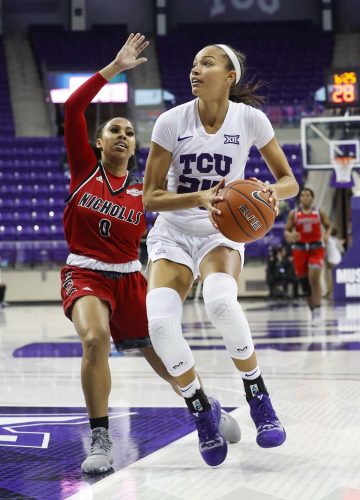
In one heartbreaking day, Kianna Ray and the women’s basketball team — while in Kansas City, Missouri, preparing for the Big 12 Championship — learned the conference tournament had been canceled. On the flight home, the women’s team learned the NCAA had canceled March Madness. Courtesy of TCU Athletics | Photo by Sharon Ellman
When the team arrived back on campus, they were greeted by cheers of support and praise from the TCU baseball team and members of the athletics staff. “That was a very special moment to be a part of. It is just another testament to what TCU means by ‘Frog Family,’ ” Ray said.
“I’m going to miss competing with my teammates and playing for this program,” she said, “but everything that happens off the court is just as meaningful, and I think that’s what I will miss the most.”
Speech-language pathology major Lindsay Tretton completed her final few weeks at TCU from her home in Florida. The sole senior on our New York experience, she said she was already beginning to feel a bittersweet twinge when she thought about leaving behind her undergraduate years.
Throughout spring break, every time one of us would ask a “What-if?” question (What if flights are canceled? What if our classes don’t transition well online? What if we run out of hand sanitizer?), Tretton’s question was always, “What if they cancel graduation?”
Chancellor Boschini elected to move the Spring 2020 ceremony to August in hopes students would be able to say goodbye to their friends — and TCU — in person. “We are going to knock ourselves out to give members — both graduate and undergraduate — of this graduating class a day to remember!” Boschini wrote in an email. His missive was signed with a picture of a banner that read, “It’s Not Goodbye. It’s See You Later, Frogs.”
Although there were early discussions about hosting a virtual graduation, Boschini said he received an overwhelming number of emails, calls and texts from students advocating for an on-campus graduation.
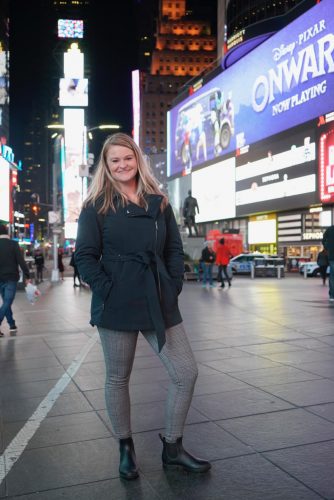
Lindsay Tretton finished her senior year at home in Florida instead of on campus. Courtesy of Lindsay Tretton
“That’s the thing you look forward to as a senior — your graduation after four years of hard work,” Tretton said. “The fact that [Boschini] is postponing the commencement … is very reassuring, and I know it means a lot to me and my friends.”
In the fall, Tretton plans to move to Boston to pursue a master’s degree in speech-language pathology.
“I think TCU did everything to make sure they’re there for the students, to make sure they’re listening to the students’ needs,” Tretton said. “It just makes me really proud to be a Horned Frog, really proud to say I go to TCU, and just makes me even more excited to come back in August to know that this isn’t the final chapter.”
Our Hearts Are Here
Senior musical theatre major Canali Miller said he loved spending the past four years performing in musicals, serving as a Frog Camp facilitator and bringing school spirit to the football games as a Dutchman.
Last fall, he enrolled in the theatre department’s yearlong Senior Showcase class. Over six months, seniors planning to pursue a career in show business prepared songs, monologues and other material to show off their skills and talent. In 2020, the seniors had the opportunity to perform for high-profile New York City agents over spring break (a separate trip from our Cultural Memory adventure).
The first few days in Manhattan, the seniors participated in workshops with agents and casting directors who offered immediate, constructive feedback, giving them a glimpse of what life would be like as a professional performer.
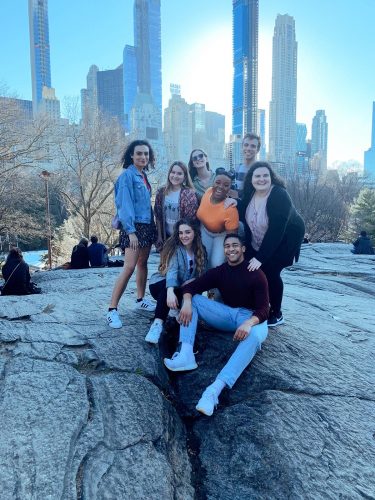
Canali Miller, front seated, was in New York City preparing to perform for high-profile agents when Broadway shut down. Courtesy of Canali Miller
But everything changed when Broadway shut down on March 12 to ensure social distancing. The TCU seniors were in the middle of a private showcase performance when an agent rushed away to take a call from a frantic client. Soon after, the remaining agents requested a 10-minute recess so they could console their clients, many of whom didn’t know how they would pay for rent or groceries.
Miller and his classmates went to New York with the dream of signing with agents who could open doors for their careers. Thirty-nine agents were scheduled to watch their long-rehearsed senior showcase. Only 12 came.
He said the group shed a few tears upon discovering they had spent their final days on campus together without knowing it. “We didn’t anticipate the last time we’d be walking to class would be the last time, or the last time grabbing coffee from the cafe, or the last time sitting in the library with friends. … There’s a lot of lasts that we didn’t get to do, and it kind of feels like there’s no closure.”
On the Cultural Memory course’s last evening in New York, we went to the senior showcase’s big night at Feinstein’s/54 Below theater. I was apprehensive about spending three hours in a stuffy basement. But our group agreed that with warnings about social distancing and Broadway’s shutdown pulling away potential agents, we might be the only people in the audience to support the seniors.
As we descended the staircase into the theater, I was shocked to find a room overflowing with people. In response to last-minute requests for support posted on social media, TCU alumni packed every booth and table, every seat at the bar, every single square inch of carpet. The room buzzed with energy — not the fearful bursts of energy we had been experiencing throughout the week, but a lively energy fueled by the sense of connection among people in the room.
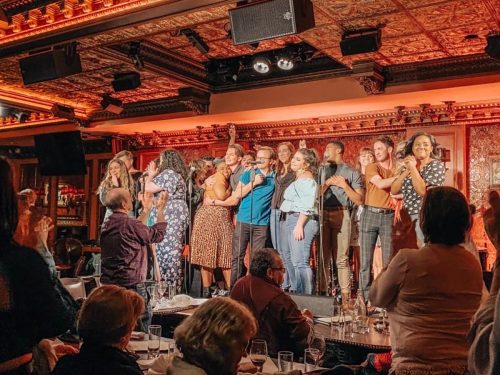
The senior showcase’s big night at Feinstein’s/54 Below theater ended in an impromptu singing of the TCU alma mater. Courtesy of TCU Theatre
The theatre seniors were miraculous. I felt like I had never been in a room full of such talent and passion. Duos and trios took turns dominating the stage, with the performers’ classmates cheering from the crowd. As the night drew to a close, Miller and his duet partner, senior Alli Franken, performed “What Do You Know About Love?” from the Broadway musical version of Frozen.
After the last number, the last round of applause, there was a sudden silence. Then the pianist began to play. From memory, every single person began to sing TCU’s alma mater.
Mem’ries sweet, comrades true
Light of faith, follow through
Praise to thee, TCU.
When I left for New York to explore the ways our culture remembers the moments that shape our history, I had no idea I would spend the next few days — and weeks and months to follow — actually living through one of these pivotal events.
Over the course of the Cultural Memory class, I learned that in tragic times, encouragement and unity rise to the occasion. And the TCU family continues to come together under the values of love, care and support.

Your comments are welcome
Comments
Related reading:
Mapping the Coronavirus
Emma Hodcroft says warmer weather may slow the virus, but that doesn’t mean it’s contained.
Campus News: Alma Matters, Letters
Chancellor Responds to Coronavirus Challenges
There was no playbook for the spring semester of 2020.
Coronanomics 101
With an abundance of caution in these unprecedented and uncertain times, here’s my take on Coronanomics.